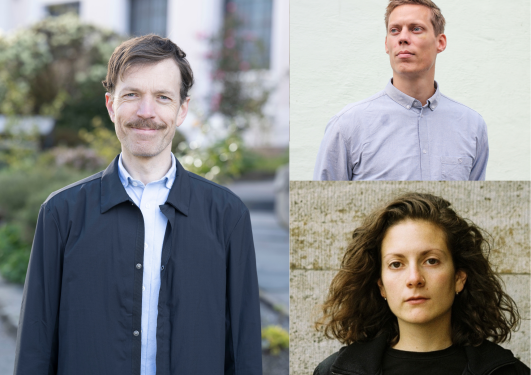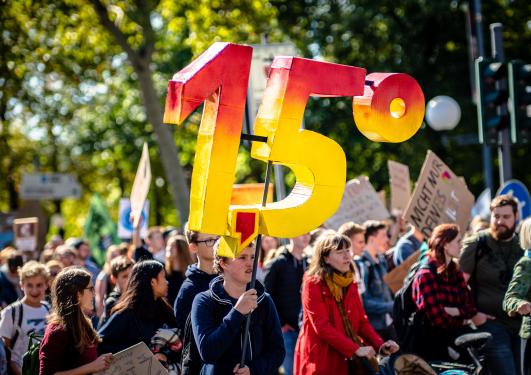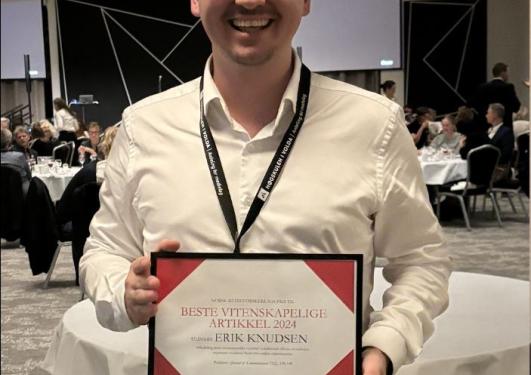
Bergen Media Use Research Group is part of the Department of Information Science and Media Studies, and is led by Hallvard Moe and Brita Ytre-Arne. The group researches how people use media - as audiences, users and citizens, and how they relate to each other and to society through media.
New Publications
How people make sense of climate issues in the news (2025) Hallvard Moe, Brita Ytre-Arne og Solveig Høegh-Krohn
Climate Change Is an Intangible News Topic: A Qualitative Analysis of Audience Perceptions (2025) Solveig Høegh-Krohn, Håvard Haarstad og Brita Ytre-Arne
Infocomics vs Infodemics: How Comics Utilise Health, Data and Media Literacies (2024) Anna Feigenbaum, Julian McDougall & Ozlem Demirkol Tonnesen
Transferred expectations of human presence: Folk theories among older adults who are inexperienced users of online services (2024) Hilde Sakariassen and Brita Ytre-Arne.
The Burden of Subscribing: How Young People Experience Digital News Subscriptions. (2023) Marianne Borchgrevink-Brækhus, Hallvard Moe
Ritual check-in, shocked immersion, regained stability: A sequential typology of news experiences in crisis situations (2023) Hallvard Moe, Torgeir Uberg Nærland, Brita Ytre-Arne
Operationalizing distribution as a key concept for public sphere theory. A call for ethnographic sensibility of different social worlds (2023) Hallvard Moe
Growing out of overconnection: The process of dis/connecting among Norwegian and Portuguese teenagers (2023) - Ana Jorge, Mehri S. Agai and Leonor Cunha-Vas Martinho
Polarisation and echo chambers? Making sense of the climate issue with social media in everyday life (2023) - Hallvard Moe, Synnøve Skarbø Lindtner and Brita Ytre-Arne
Monitoring the infection rate: Explaining the meaning of matrics in pandemic news experiences (2023) - John Magnus Raghnildson Dahl and Brita Ytre-Arne
Citizens´news use during Covid-19: Concerns about misinformation and reliance on local news in Denmark, Finland, Norway and Sweden (2023) - Brita Ytre-Arne and Hallvard Moe
Travelling Girlhood: Feminist Discourses as Narrative Resources for the American Adaption of Norwegian High School Drama SKAM (2022) - Dag Skarstein and Synnøve Skarbø Lindtner
"Well, That´s Just My Opinion": The Principle of Expression and the Public Debate (2022) - Ida Vikrøen Andersen
How the public understands news media trust: An open-ended approach (2021) - Erik Knudsen, Stefan Dahlberg and Silje Nygaard
Disconnectivity synced with identity cultivation: adolescent narratives of digital disconnection (2022) - Mehri S. Agai
Understanding digital disconnection beyond media studies (2021) - Hallvard Moe and Ole Jacob Madsen
Privacy, energy, time and moments stolen: Social media experiences pushing towards disconnection (2021) - Trine Syvertsen and Brita Ytre-Arne
Towards responsible media recommendation (2021) - Mehdi Elahi, Dietmar Jannach, Lars Skjærven, Erik Knudsen et al.
Why so quiet? Exploring inhibition in digital public spaces (2021) - Hilde Sakariassen and Irene Costera Meijer
Women's emotion work on Facebook: Strategic use of emotions in public discourse (2021) - Hilde Sakariassen
Towards a critical understanding of data visualisation in democracy: a deliberative systems approach (2021) - Torgeir Uberg Nærland and Martin Engebretsen
Advancing digital disconnection research: Introduction to the special issue (2021) - Stine Lomborg and Brita Ytre-Arne
Doomscrolling, Monitoring and Avoiding: News Use in COVID-19 Pandemic Lockdown (2021) - Brita Ytre-Arne and Hallvard Moe
Intrusive media and knowledge work: how knowledge workers negotiate digital media norms in the pursuit of focused work (2021) - Faltin Karlsen and Brita Ytre-Arne
Nordic journalists’ conceptual roles and perceived influences - A European and inter-Nordic comparison (2021) - Jan Fredrik Hovden and Jari Väliverronen
Class and everyday media use: A case study from Norway (2021) - Jan Fredrik Hovden and Lennart Rosenlund
How the public understands news media trust: An open-ended approach (2021) - Erik Knudsen, Stefan Dahlberg, Magnus Iversen, Mikeal Johannesson and Silje Nygaard
Hostility online: Flaming, trolling, and the public debate (2021) - Ida Vikøren Andersen
The Democratic Significance of Everyday News Use: Using Diaries to Understand Public Connection over Time and beyond Journalism (2021) - Hallvard Moe and Brita Ytre-Arne
From Wanderers to Strangers. The shifting space of Scandinavian immigration debate 1970–2016 (2020) - Jan Fredrik Hovden
Instead of the deliberative debate: How the principle of expression plays out in the news-generated Facebook discussion. (2020) - Ida V. Andersen
Temporal ambivalences in smartphone use: Conflicting flows, conflicting responsibilities (2020) - Brita Ytre-Arne, Trine Syvertsen, Hallvard Moe and Faltin Karlsen
A digital public sphere: Just in theory or a perceived reality for users of social network sites? (2020) - Hilde Sakariassen
Populism and popular culture: a case for identity-oriented research. In Krämer, B. & Holtz-Bacha, C. (eds) Perspectives on populism and the media. (2020) - Torgeir U. Nærland
Affective Polarization in Multiparty Systems? Comparing Affective Polarization Towards Voters and Parties in Norway and the United States (2020) - Erik Knudsen
Disentangling the Influence of Recommender Attributes and News-Story Attributes: A Conjoint Experiment on Exposure and Sharing Decisions on Social Networking Sites (2020) - Mikael Poul Johannesson and Erik Knudsen
Audiences’ Communicative Agency in a Datafied Age: Interpretative, Relational and Increasingly Prospective (2020) - Brita Ytre-Arne and Ranjana Das
Enabling Cultural Policies? Culture, Capabilities and Citizenship (2020) - Torgeir U. Nærland, Jan Fredrik Hovden and Hallvard Moe
Methods for datafication, datafication of methods (2020) - Stine Lomborg, Lina Dencik and Hallvard Moe
Deliberative Systems Theory and Citizens’ Use of Online Media (2020) - Cathrine Holst and Hallvard Moe




